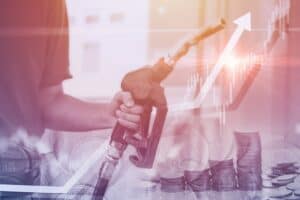Petrol price breakdown: What the oil cartels charge and what we pay at the pumps. Where is the money going?

Have you ever wondered why petrol prices are so high?
Year on year, petrol prices are climbing, and it’s not unusual to find yourself reminiscing about the days it when it was cheaper to fill up your car.
Petrol prices, what are you paying for?
A substantial portion of the petrol price, which recently hit a record high of over R20 a litre, is due to the fluctuating Rand and global crude oil prices.
But, the total make-up of the local petrol price is extremely complex.
A substantial portion of the petrol prices is levied to the government for road maintenance. (Hard to believe, considering the appalling condition of our roads.)

The petrol price is set monthly by the Department of Mineral Resources and Energy.
It’s generally the same across the country, apart from at the coast, where it is cheaper because there is no need for long fuel lines to get it inland.
The role of petroleum cartels in soaring petrol prices
The Rand has recently been weakening due mainly to the dollar’s strength, and the cost of purchasing oil – in dollars – has become more expensive.
The oil price itself has increased, now hovering above $70 a barrel of Brent crude compared to half that in 2020.
The petrol price may still climb. The Organization of the Petroleum Exporting Countries (OPEC) will continue to adjust the oil supply to ensure that supply is sustainable”, explains Astron Energy General Manager Retail Tebogo Mekoa.
“This is basic economics; when supply is limited and demand increases, the price goes up,” said Mekoa.
Those who want an idea of what the fuel price will be before it is announced can go onto the Central Energy Fund’s website, where the over/under-recovery prices are shown.
“Because prices are adjusted monthly, the government needs to either drop the price if it was charging too much because oil dropped, or hike it if it was charging too little,” explains Mekoa.
Fuel companies do not set the fuel price.
Petrol levies, how much goes to maintanence
The basic fuel price, based on currency and oil movements, makes up almost half of the cost.
The remainder of the cost of petrol is levied, which are adjusted each February in the National Budget Speech.
Mekoa said a third of the price comes from levies and taxes, such as for the Road Accident Fund, which pays out when people are injured in an accident.
Also Read: Mantashe warns petrol will be even more expensive if e-tolls are scrapped
The other is the general fuel levy, which goes towards maintaining our road network.
The remainder of the cost lies in retail and wholesale margins, set by the government at 14% for fuel retailers and storage and distribution costs (6%), such as piping fuel to Johannesburg from Durban.
Here’s how you can save petrol
While the fuel price is out of our control, there are ways you can save money on fuel, particularly now with the festive season, when many South Africans hit the road for long journeys home or to go on holiday.
- Avoid keeping your car idling if you are not driving anywhere. This burns unnecessary petrol.
- Make sure your tyres are inflated according to manufacturing specifications, as incorrect tyre pressure can lead to increased fuel consumption, and also pose a safety risk.
- Stick to the recommended speed limited and even better, drive at around 10% slower than the limit so as to save more petrol.
- Use air conditioning sparingly, as this also runs up the petrol bill.
- Don’t drive with your windows open as this creates unnecessary drag.
- Use apps such as Google Maps or Waze to determine the best route with the least traffic congestion.
- Use cruise control if your vehicle has such a function.
- Keep your car maintained and serviced on a regular basis. Sludge in the engine instead of clean oil, as well as clogged filters, cause the motor to work harder
(Compiled by Narissa Subramoney)
NOW READ: Petrol price drop likely in the new year
Support Local Journalism
Add The Citizen as a Preferred Source on Google and follow us on Google News to see more of our trusted reporting in Google News and Top Stories.






